- Home
- Warwick Deeping
Two in a Train Page 5
Two in a Train Read online
Page 5
He knelt down, and put his head close to the professor’s chest. No, his master was breathing. And Hands lumbered up and off into the dining-room. The professor did indulge occasionally in old French brandy. Hands extracted the bottle from the sideboard and hurried back.
But he paused in the laboratory doorway, and stood staring. The professor was sitting up, looking bemused, ghastly and bewildered. The fingers of his right hand were stroking his forehead. He gazed at Hands, and his eyes were vacant.
“My God—you gave me a shock, sir!”
The professor’s lips moved, mumbling something. He looked round the shattered room.
“What happened, sir? Something exploded? Have some brandy, sir.”
The professor looked at the brandy bottle, nodded, and allowed Hands to trickle some of the spirit between his lips. He gurgled, he spluttered, and suddenly, clutching Hands’s arm and shoulder, he struggled up. He still looked ghastly, but his very ghastliness was exultant.
“Eureka!”
Hands blinked at him.
“Where shall I find it, sir? In your shaving cupboard?”
And suddenly Professor Pye laughed, a strange, creaking and discordant laugh.
“No, I’ve got it, Hands, I’ve got it. Eureka, Eureka!”
IV
When the Masters of Science speak of protons, electrons and neutrons, and describe strange bombardments, and streams of particles shooting at high speed through a substance that has every appearance of being solid, the plain man must listen and accept the strange things that these adepts tell him. At home in the suburbs the plain man may fiddle with his wireless, and repeat some of the jargon of the technical press, but in the matter of knowledge he is but a child. His may be the right to say, “Well—I’m damned! What will these scientific fellows do next?” The marvels of research may leave him gaping, and feeling perhaps vaguely uncomfortable, and certainly had any John Citizen been allowed to peep into the mental workshop of Professor Pye he would have felt supremely uneasy.
For Professor Pye had taken a leap beyond his contemporaries. He had discovered and isolated a little creature that he called the “On.” It would not be possible for an untechnical scribbler to describe the manifestations and mysteries of this child of the atom. Professor Pye had brought a little stranger into the world of man’s awareness, and with a complex of glass tubes, electrical force and certain chemicals had caused the On to manifest. That the On or congeries of Ons had nearly killed him was neither here nor there. Professor Pye, working upon certain hypotheses, had taken risks. His idea was not only to isolate the On, but to control and use it.
A minute manifestation of On-force had blown a screen of argonil to atoms, but the protecting tube of palmyrium had stood the shock. Apparently palmyrium was impervious to the On. That—of course—had to be proved and tested with an increasing stress of On-force, but if a palmyrium box or tube could be produced that could contain and confine the streams of Ons when Professor Pye’s process produced them, then——! Professor Pye, standing on his concrete tower and looking out across this peaceful English valley, smiled a truculent little smile, and rubbed his beard. He, Alfred Pye, granted that his hypotheses were correct, would have under his hand a strange new force that could be controlled and projected into space. What its ultimate effects would be upon things organic and inorganic he could not yet say, but judging by his experience of a minute release of the On-force, a larger dose would be lethal to creatures of protoplasm. It would annihilate—silently and secretly. It might be potent over a thousand miles. The German gun that bombarded Paris would be a mere crude and barbaric toy compared with it.
For some time after the wrecking of the laboratory Jack Hands was worried and nervous. Apparently, Professor Pye had been immensely excited over the result of some particular experiment, and it was probable that the experiment would be repeated. Hands, simple soul, was more worried about his dog than about himself. He spoke to the professor.
“Are there going to be any more—explosions, sir?”
For Professor Pye was working far into the nights. Hands, worried and restless, had seen the laboratory windows lit up at two in the morning, and fear is more fearful at night.
“You see—I could put Jumbo to sleep in the tool-house.”
Alfred Pye had no sense of humour, or any feeling for pathos. Moreover, he was becoming more and more the little megalomaniac swollen with a sense of imminent and catastrophic power. In fact, Professor Pye was not quite sane in that he represented pure and pitiless intelligence divorced from all emotion and the social urges. He spoke curtly to Hands.
“Don’t be a fool, man. Bring me my lunch in here.”
Professor Pye was in apron and shirt-sleeves, and standing by his electric furnace. Hands could see that some queer apparatus was in process of construction, for Pye had so great a contempt for his man’s intelligence that he let him stand and stare. The professor was not only an inspired physicist but an expert mechanic. He had small, strong, delicate fingers, hands of infinite dexterity and precision. He was capable of manufacturing a watch or turning out the most sensitive of instruments. Being a separatist and secretive he had trained himself to do these things.
Hands went for the professor’s lunch, an apple, six dry biscuits and two wedges of Swiss Gruyère cheese. He was placing the tray on a laboratory table when the professor—who had quick ears—heard the sound of a car in the little courtyard behind the house.
“Who’s that?”
Hands—of course—had heard nothing. Pye, who was beginning to nourish acute suspicion now that his researches were nearing fruition, went to one of the laboratory windows. It was a high window, and Pye had to stand on a stool to look out.
“A woman in a car. Go and see what she wants.”
The professor pulled down the blinds on the side next the courtyard, and Hands hurried out to interview the visitor. She was elderly, plump and pleasant. She looked compassionately at Hands’s disfigured face, and produced a little book.
“I am sure you will excuse me calling at this hour, but could I see Professor Pye?”
Hands, with his eyes watching her lips, explained somewhat apologetically that the professor was not easy of approach. The lady smiled upon Hands.
“But won’t you go and ask him to see—me?”
“What name, ma’am?”
“Mrs. Millard.”
Hands returned to the laboratory where Pye, sitting on a stool, was eating cheese and biscuit.
“A lady named Millard, sir. Her compliments and would you——?”
“What does she want?”
“I don’t know, sir. She’s got a little book.”
“A damned journalist! Go and tell her to go to——”
Hands did not deliver the message as he had received it from Professor Pye. He explained that the professor was busy in his laboratory and could not be disturbed.
Mrs. Millard smiled her social-service smile.
“I—quite—understand. I called to see if Professor Pye would subscribe to the S.P.C.C. I’m collecting subscriptions for our committee.”
Hands was puzzled but wishing to be helpful.
“The S.P.C.C., ma’am?”
“Yes, the Society for Prevention of Cruelty to Children.”
Hands took the book, and ventured once more into the laboratory.
“The lady wants a subscription, sir.”
“A subscription?”
“Yes, sir, to the Society for the Prevention of Cruelty to Children.”
The professor was eating his apple. His face registered a curious, twisted little smirk. He cackled, and the sound was sinister.
“Quite superfluous. Sadism is an interesting human trait. Well, I’ll give her something. Pass me my coat.”
Hands fetched it from the hook on the laboratory door.
“She’s quite a nice lady, sir.”
“That’s not unusual, Hands, when they are after favours.”
Professor Pye picke
d a pound note from his wallet and passed it to Hands.
“Give her that. No, I don’t want to put my name in her wretched little book. Get rid of her.”
Hands went out to announce the good news to the nice lady, and Professor Pye resumed the eating of his apple. His nostrils expressed scorn.
“Prevention of Cruelty to Children! Better that most of the little wretches shouldn’t be born. Cruelty! Is an earthquake cruel? Can my intelligence be cruel—to ants?”
V
During the whole of that summer Professor Pye was at work upon what may be described as his Atomic Gun. Externally it consisted of a tube of palmyrium mounted on a tripod stand, and in appearance not unlike a machine-gun. Its mouth could be closed by a diaphragm of palmyrium, and to the centre of the tube electric leads were attached. The apparatus’s interior could have been described only by Professor Pye himself, and the description was set down in cypher in a note book which he kept locked in a safe.
Also, during the whole of August he kept the laboratory locked, and Hands, brooding over his exclusion, was both a little grieved and tempted. Moreover, Professor Pye’s temper had become like the English weather, absolutely unpredictable in its moods and phases. He was extraordinarily taciturn. He emerged from the lab. to munch his biscuits and apples in the dining-room, and the lab. key was in his pocket.
Hands, who after all was human, did make one attempt to play Peeping Tom one day while the Professor was at lunch. Undoubtedly, the old boy was up to something, and Hands had not escaped the world’s passion for sensationalism. Since the laboratory door was locked, and the key in the professor’s pocket, he would have to attempt the windows, but when Hands sneaked round with an empty grocery box for a stool he found that the windows were shut and the blinds drawn. Obviously, Professor Pye had something to hide, and he was not taking any chances.
And Hands wondered. He was not without education in the matter of lurid literature. Like many simple souls and children he had a fantastic fancy. Now—just what would a very ingenious gentleman create in a lonely and a sexless spot like this? Sex and its bitter and baffled urges vexed Hands not a little. Supposing an old man like the professor had dreamed amorous dreams and was proposing to create a sort of mechanical Venus?
“Damn it,” said Hands—“why not?”
The fantastic notion piqued him. He even chortled over it. Certainly, this would be a species of creation that a man like Professor Pye would keep draped and screened. And then Hands had a feeling that somehow his carnal fancy had overstepped the bounds of decency.
Eminent scientists should be allowed to transcend the erotic. Professor Pye might be planning to fly to the moon.
Hands felt bothered by a certain personal turgidity, and when the flesh vexed him he dug hard in his garden or took Jumbo for a walk. On occasions he would ramble along the downs for miles, finding solace and solitude, while Jumbo discovered rabbits, imaginary and otherwise. To Hands his dog was a dumb but eloquent preceptor. The little beast had attached himself to a lone man to the exclusion of all canine calls.
“Marvellous!” Hands would exclaim, “Jumbo, you can teach me something.”
It was a Thursday in September when Hands asked Professor Pye to grant him leave of absence for the afternoon, and though he did not know it, the request toned with the professor’s plans. He was in a state of concealed excitement. He had been wanting to get rid of Hands for the afternoon.
“I’d like to take the dog for a walk, sir.”
Pye was affable.
“Certainly, Hands, certainly. You can have the whole afternoon. By the way, you haven’t had a holiday since you’ve been here.”
“No, sir.”
“You must take a holiday, Hands. Haven’t you any relations?”
“I’ve a brother in Brighton, sir.”
“Well, arrange to take a holiday. I may be going to stay at my London club for a week.”
“Holidays aren’t much in my line, sir. You see——”
The professor was emphatic.
“Everybody needs a holiday sometimes. Change of environment. You must go for a holiday, Hands.”
Hands took Jumbo out on the downs towards Dorking. Now, just what was the old fellow at? Was he really going to London, or did he desire Jack Hands’s absence for a period? Hands had taken a Thermos with him, and a parcel of bread and butter and cake. The professor allowed him grocer’s cake, the yellow stuff with cherries in it, but on that day Jumbo consumed most of the cake. Hands was feeling strangely depressed. Almost, he seemed to be suffering from some unpleasant premonition.
Not so Professor Pye. He carried that four-foot tube of alloy with its tripod to the top of the observation tower, and linked it to a power plug by long flexes that ran from one of the lab. windows and were raised by a cord to the top of the little concrete tower. It was a serene and perfect September day, windless and golden, but Professor Pye had no eyes for the beauty of the landscape. His hands trembled as he attached the wires to the apparatus. He was face to face with his crisis, and he was facing more than a critical experiment. He was confronting death, personal annihilation. He could regulate his current, and release what he might estimate to be a small charge of On-force, but he could not swear that the new force would not shatter the apparatus and kill its creator.
But he needed a target, something protoplasmic and obvious upon which he could train the atomic gun. He stood looking down over the low parapet, and the target offered itself, some cows in a field in the hollow of the valley. These cows belonged to Mr. Honniset of Fox Farm, and they were pastured in two different fields separated by a strip of arable. One of the fields was less than three hundred yards away, the other more than a quarter of a mile. Professor Pye trained the gun on the farther field, and stood back behind it with his foot on the contact-maker.
For one moment he hesitated. There was a faint click as a flexible wire operated the diaphragm, a second click as his foot pressed the make and break. The palmyrium tube remained motionless; there was no sound, no suggestion of vibration. Professor Pye stood with his eyes fixed on the apparatus. He had been prepared for a possible catastrophe, blackness, oblivion.
Apparently, nothing that could be registered by the senses had happened. Professor Pye kept his foot on the contact maker for three seconds, released it, and closed the diaphragm. A curious little grin seemed to trickle into his beard. What had happened? Had anything happened? He was conscious of furious excitement and a feeling of personal reprieve. He had let the thing loose, and he was alive.
He walked to the parapet and looked down into the valley. The cows in the farther field had been grazing in a group, and every beast in that field was down. Dead? The animals were lying on their sides, legs and heads extended. The cows in the near field were still grazing. Professor Pye’s face expressed a kind of demonic exultation. His hair stood up like the crest of a cockatoo. But were those cows dead, or merely shocked and temporarily helpless? He dashed downstairs for a pair of field-glasses, returned, and crouching behind the parapet, focused his glasses on the field.
He realized that he was looking at carcasses. The flaccid, inert posture of the bodies was unmistakable. He watched them intently for five minutes, and not one of the animals gave any sign of life.
Professor Pye stood up. His face was the face of a man who was not quite sane. It might have been the face of a Biblical Satan, or of a mischievous, malignant and amoral boy who had perpetrated some cunning outrage and who gloated over its success. What were a few cows compared with the discovery that he could kill, silently, swiftly, secretly? He possessed power, power such as no other man had ever commanded. He had evolved that power. It was his.
VI
But it was not merely a question of dead cows.
The beasts in the near field had not been touched, and Professor Pye, reflecting upon that fact, realized that for some unknown reason there was a non-lethal zone surrounding his gun. Queer, that! The area of the dispersion of the On-force would
have to be studied and tabulated.
What was its range?
His gaze travelled beyond the farther field, and then it was that Professor Pye realized that something unusual was happening down there in the valley. The projected line of force had traversed the strip of high road that was visible from the tower, and in the roadway, or rather in the hedges, the professor could distinguish what appeared to be the wreckage of motor-cars. One of them was alight and burning brightly.
He raised his glasses and crouched.
Other cars were piling up in the road to left and right of the wreckage. Little figures were active. A man could be seen squirting the burning car with a fire extinguisher. Another man joined him.
And then Professor Pye understood, and drew swift and stark conclusions. The On-force had caught those two cars, killed the drivers, and the machines had run off the road and crashed! For a moment his face showed bleak and sharp, lips retracted, nostrils pinched. He crouched there. He had killed more than a few cows. And what—exactly—had he killed? How far had the force travelled? Had it sped for miles and left a death track behind it?
If ever a man was taken to a high place by the Satan that is self and tempted, Professor Pye was that man. He crouched between compassion and the consciousness of unrestrained and intoxicating power. He was tempted perhaps as few men of science have been tempted. He could bless or he could curse. But whereas most men of science are also social men, Professor Pye was not a social creature. He was one of the world’s paranoiacs, a man who had cherished a sense of his own infinite significance, and the conviction that the world had persecuted him and denied him greatness. His was a case in which a malignantly sane intelligence was socially insane. He was a little, venomous Jehovah looking down upon the world of men and finding it vile and hateful.
He stood up. He extended his arms like some prophet cursing his generation. Almost his face was maniacal. He slavered into his beard.
“You legion of swine. Mine—is the power. It shall not spare you.”

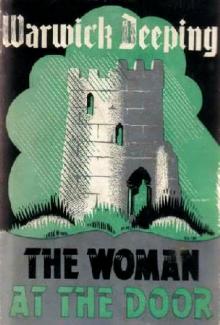 The Woman at The Door
The Woman at The Door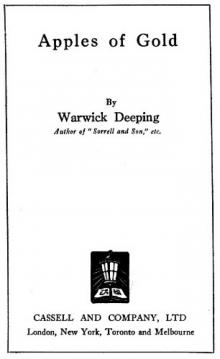 Apples of Gold
Apples of Gold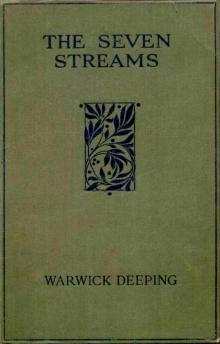 The Seven Streams
The Seven Streams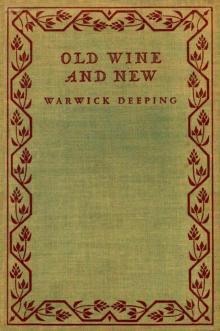 Old Wine and New
Old Wine and New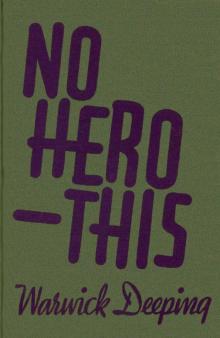 No Hero-This
No Hero-This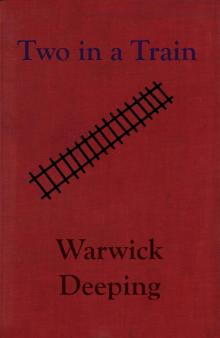 Two in a Train
Two in a Train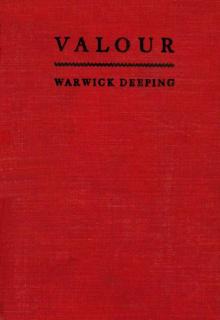 Valour
Valour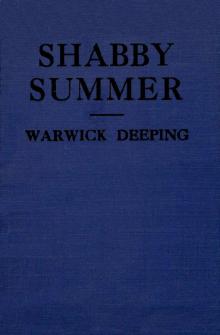 Shabby Summer
Shabby Summer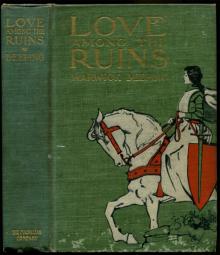 Love Among the Ruins
Love Among the Ruins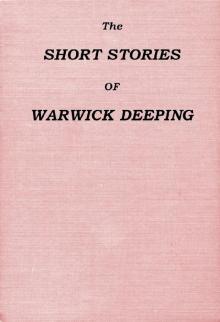 The Short Stories of Warwick Deeping
The Short Stories of Warwick Deeping